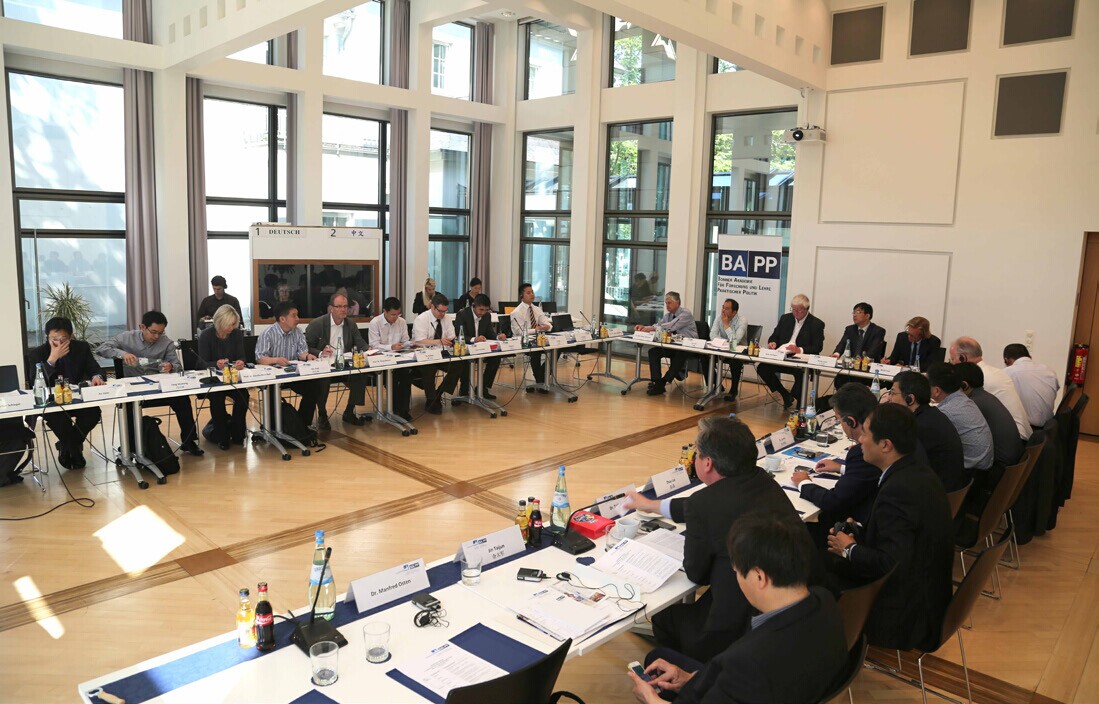Nation-market sound interaction advances modern society, scholars discuss at forum

The 2nd Chinese-German Higher Academic Forum was held in Bonn on June 11-12, jointly sponsored by Social Sciences in China Press and the Applied Politics Institute of the University of Bonn. More than 20 scholars gathered to discuss issues across a range of disciplines around the theme of “the nation, society and the market.”
The dean of the Applied Politics Institute of the University of Bonn, Bodo Hombach, in addressing the conference with welcome remarks, stated that both China and Germany face great challenges in the context of today’s globalization. This calls for continuous efforts by both countries to seek new paths of development to ensure social and economic advances. The conference provides an open platform for academics in both countries to have conversations and explore solutions that are salutary and appropriate.
Wang Limin, deputy editor-in-chief of Social Sciences in China Press(SSCP), noted that it is of great significance that scholars from China and Germany communicate with each other across a spectrum of disciplines and perspectives.
In October last year, the Communist Party of China (CPC) promulgated the grand guidelines for Chinese social reforms in future years. At the beginning of this year, Chinese President Xi Jinping reiterated the importance of optimizing the socialist system with Chinese characteristics. It is a realistic task for China to modernize its governing system and governing capabilities so as to meet the demand of future reforms, Wang continued.
China and Germany, which share an enduring friendship, have accumulated rich experience that differs from that of Britain and America. “We gathered here to exchange experience and thoughts in academic research which will be absolutely conducive to common issues that we are going to confront in future.” Wang concluded.
Democracy in two systems
The intrinsic binary structural framework of national and social governance is no longer theoretically effective in keeping pace with social developments in the context of globalization, commented Zhang Mingjun, dean of the School of Political Science and Public Management. Realizing balanced development in China, a country with vast territory and a dense population, is a systematic task with strategic importance.
Democracy in deliberative and electoral forms is an important portion of modern Chinese democratic politics. The former governor of Nordrhein-Westfalen, Germany remarked that there is no big difference between deliberative democracy and electoral democracy. In giving full rein to the functions of the party, publicizing political concepts and achieving internal unity, the two could act in concert.
Rudolf Albert Scharping, CEO of Rudolf Scharping Strategic Consultation & Communication, said the role of the market as defined in the Decision on Major Issues Concerning Comprehensively Deepening Reform, passed during The Third Plenary Session of the 18th Central Committee of the CPC, is quite encouraging. The new reform strategy proposed under the leadership of Xi Jinping is a breakthrough in a theoretical sense.
In the panel of discussing “developing model of democracy and economic transformation”, Professor Wang Shizong from the School of Public Affairs at Zhejiang University maintains that differences in national realties mean that imitation of Western modes in China is inadvisable.
The Director of the Federal Academy of Security Policy, Hans-Dieter Heumann, noted that although there exist divergences as to Chinese and German realities, mutual learning and respect are of paramount importance. Democracy plays an indispensible role in facilitating the advance of modern society. However, some problems arise concerning the system of referendums and the mutual restriction of different parties in policy-making; together with public apathy toward political participation, this leads to the inefficiency of German democracy, which is difficult to resolve.
Sound SME operation
The sound operation of German’s small and medium enterprises (SME) during the financial crisis was an important issue for some participants at the forum. The Director of the Department of Economics at Fachhochschule Bonn-Rhein-Sieg, Kraus Clementina, attributed this to the transformation of the role of the German government, as well as to the mutual benefits between financial institutions and societal forces, which helped solve some financial problems. The success can also be attributed to the cohesion of the market system, universities and research institutes, which invigorated German industry.
Professor Jiang An from the Department of Social Science said that evaluating market subjectivity and delving into its significance in national prosperity within today’s international system are helpful to achieve a more scientific governing mode. This could also provide broader perspectives for the analysis of interrelations between enterprises and the market.
Watching role of media
The importance of information communication was also a focus of discussion in the conference. Professor Zhi Tingrong from the School of Journalism & Communication at Jinan University pointed out that the complex interaction of officers and the public at the governmental and local level should be dealt with appropriately.
Hombach noted that a rational attitude should be taken toward the role of media, especially the influence of the Internet, and added that otherwise the authenticity of media and journalism would decline as a result.
In making concluding remarks, Sun Hui, deputy editor-in-chief of SSCP, stressed that China’s reform was a groundbreaking experiment without mirroring the Western model. This marks China’s salutary exploration of incrementally enriching its socialist democracy in implementing marketization.
Both China and Germany are making efforts to actively seek the balanced interaction of the nation, society, and the market. This should be one of the essential dimensions of modernization, Sun said.
The opening of the forum is one of the important achievements of SSCP in delivering “China’s voice” and telling “Chinese stories”. It advances dialogues between Chinese academe and government, business and academic circles in Germany.
The Chinese version appeared in Chinese Social Sciences Today, No. 605, Jun.9, 2014
The Chinese link is: http://news.cssn.cn/zx/bwyc/201406/t20140609_1201260.shtml
Translated by Feng Daimei
